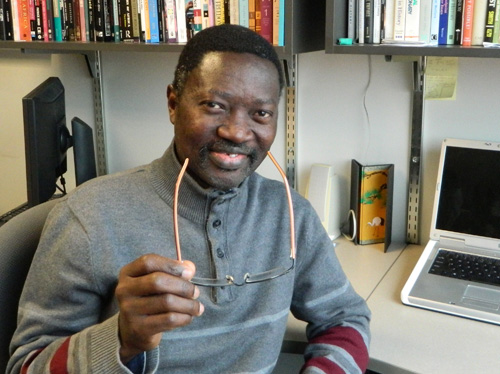
Which Christian denomination holds the most appeal for people in Africa? It’s not mainstream in Canada, but Pentecostalism is the largest and fastest-growing denomination of Christianity in Nigeria – in fact, it’s ranked number one in all of Africa and in much of Asia and South America as well. “Some estimates show that globally, it’s surpassed the Catholic Church,” says U of G history professor Femi Kolapo.
Why has this particular branch of Christianity become more popular than the evangelical mainstream in North America? Kolapo explains that “Pentecostalism easily adapts to the cultures and traditions of different people; it validates their traditional world views. Nigerians who believe in demons, spirits and the evil eye find that these beliefs are accepted in Pentecostalism.” Even better, he adds, this brand of Christianity offers a “superior God” who can deal with the demons and witches and the problems believed to be caused by various supernatural beings.
Also, Pentecostalism comes with offers for every adherent, lay or clergy, of charismatic gifts not unlike traditional religions espouse. These divine abilities include healing the sick by laying hands on them and praying for them, speaking in unknown tongues, having divine dreams and visions, and prophesying. Stressing the indwelling of the believer by the Holy Spirit, the Pentecostal face of Christianity brings God close to the African devotees, making God out to be very personal to them and giving the devotees a powerful sense of identity and confidence.
“Most mainstream churches, such as the Anglican Church, are not as accepting of the idea of being possessed by demons or cursed by a witch, nor of casting out such demons,” says Kolapo. “Although it seems those churches are increasingly moving in that direction. For example, there is a growing charismatic movement within the Catholic, Anglican, Baptist and Methodist churches.”
This denomination appeals to people in other ways as well. Within Pentecostalism, women are treated as equals, and can be pastors or prophets. The churches are run more democratically, with opportunities for all to participate – very different from the hierarchical structure of other Christian denominations. “It de-emphasizes elitism because you don’t need to go to a seminary to become a pastor or a bishop – you just need to know that you have a calling,” says Kolapo.
In Nigeria, there are some very large Pentecostal churches. “They have thousands of members attending. Redeemed Christian Church of God, considered by many to be the largest church in the world, holds a monthly event where no less than half a million people faithfully attend,” he says.
Kolapo explains that major shifts have occurred in the Pentecostal doctrines promoted in these churches over the past two decades. “Prosperity theology” has been imported from the U.S., he says. This approach to religion stresses that God wants his followers to be wealthy, God is happy when they are rich, and poverty is a curse. Says Kolapo: “This theology fills a gap in this part of the world, where the government is not performing economically or politically.”
Initially, the Pentecostal church in Nigeria encouraged people to be “humble and God-fearing,” he says. “The church seemed to have equated poverty with piety.” Now only a minority question the rise of the prosperity theology.
Most researchers have described the effect of this rise in Pentecostalism as very positive. Some even speak of the “Pentecostal revolution” and believe it is influencing Nigerian politics and government by strengthening democracy. Kolapo, while agreeing that there are some positive aspects (he himself attends a Pentecostal church in Guelph), is not willing to go that far.
“I am concerned that the church can become a parallel political enclave that can take away from challenging poor governance and from political consciousness. The church has democratic tendencies in its organization and practice, but it is not actually trying to affect and change the government.”
He is also concerned about the doctrines that over-emphasize financial success and making money. “It suggests that if anybody becomes rich, by any means, that person is in favour with God,” he says. In addition, Pentecostalism may increase the sense of fatalism that is associated with many Nigerian traditions. As Kolapo explains, it’s the belief that if things go well, that’s God’s work, if things go badly, that’s also God’s work. “Some doctrines focus on God doing everything, and suggest that you should just ask him for what you want and God will provide.”
With that belief, people may see corruption in government, for example, but not step up to do anything because they expect God to resolve it. “I think most researchers of Nigeria’s Pentecostalism are focused on the big-city churches, while my research is broader and includes the rural communities,” he says.
Kolapo is studying how these Pentecostal beliefs affect people’s participation in government and politics in Nigeria, and how they affect Nigerians who immigrate to Canada or the U.S. “Does Pentecostalism, with its alleged democratic credentials, help people better integrate into North American civic and political life, or does it make their participation more difficult? I will be following people both in Nigeria and after they move here to see whether Nigerian Pentecostalism actually lives up to its reputation as a liberalizing and progressive force,” he says.